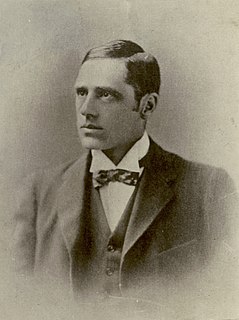
Henry Archibald Hertzberg Lawson was an Australian writer and bush poet. Along with his contemporary Banjo Paterson, Lawson is among the best-known Australian poets and fiction writers of the colonial period and is often called Australia's "greatest short story writer".

"The Man from Snowy River" is a poem by Australian bush poet Banjo Paterson. It was first published in The Bulletin, an Australian news magazine, on 26 April 1890, and was published by Angus & Robertson in October 1895, with other poems by Paterson, in The Man from Snowy River and Other Verses.

The "Bulletin Debate" was a famous dispute in The Bulletin magazine from 1892–93 between two of Australia's most iconic writers and poets: Henry Lawson and Andrew Barton "Banjo" Paterson.
Up The Country is a popular poem by iconic Australian writer and poet Henry Lawson. It was first published in The Bulletin magazine on 9 July 1892, under the title Borderland, and started the Bulletin Debate, a series of poems by both Lawson and Andrew Barton "Banjo" Paterson about the true nature of life in the Australian bush.
The Fact of the Matter is a poem by prolific Australian writer and poet Edward Dyson. It was first published in The Bulletin magazine on 30 July 1892 in reply to fellow poets Henry Lawson and Banjo Paterson. This poem formed part of the Bulletin Debate, a series of poems by Lawson, Paterson, and others, about the true nature of life in the Australian bush.
The Overflow of Clancy is a poem written under the pseudonym "H.H.C.C" and first published in The Bulletin magazine on 20 August 1892 as part of the Bulletin Debate, a series of poems about the true nature of life in the Australian bush. The poem is a parody of Paterson's Clancy of the Overflow.
Banjo, of the Overflow is a poem by Australian poet Francis Kenna. It was first published in The Bulletin magazine on 27 August 1892 in reply to fellow poets Henry Lawson, Banjo Paterson and Edward Dyson. This poem formed part of the Bulletin Debate, a series of works by Lawson, Paterson, and others, about the true nature of life in the Australian bush.

The bush ballad, bush song or bush poem is a style of poetry and folk music that depicts the life, character and scenery of the Australian bush. The typical bush ballad employs a straightforward rhyme structure to narrate a story, often one of action and adventure, and uses language that is colourful, colloquial and idiomatically Australian. Bush ballads range in tone from humorous to melancholic, and many explore themes of Australian folklore, including bushranging, droving, droughts, floods, life on the frontier, and relations between Indigenous and non-Indigenous Australians.
The Rocks Push was a notorious larrikin gang, which dominated The Rocks area of Sydney from the 1870s to the end of the 1890s. In its day it was referred to as The Push, a title which has since come to be more widely used for cliques in general and the left-wing movement the Sydney Push.
This article presents a list of the historical events and publications of Australian literature during 1892.
In Answer to Various Bards is a poem by Australian writer and poet Andrew Barton "Banjo" Paterson. It was first published in The Bulletin magazine on 1 October 1892 in reply to fellow poet Henry Lawson's poem, In Answer to "Banjo", and Otherwise.
The Poets of the Tomb is a poem by Australian writer and poet Henry Lawson. It was first published in The Bulletin magazine on 8 October 1892 in reply to fellow poet Andrew Barton "Banjo" Paterson's poem, In Answer to Various Bards.
A Voice from the Town is a poem by Australian writer and poet Andrew Barton "Banjo" Paterson. It was first published in The Bulletin magazine on 20 October 1894.
Saltbush Bill is a humorous poem by Australian writer and poet Andrew Barton "Banjo" Paterson. It was first published in The Bulletin magazine on 15 December 1894, the Christmas issue of that publication.
The Man from Snowy River and Other Verses (1895) is the first collection of poems by Australian poet Banjo Paterson. It was released in hardback by Angus and Robertson in 1895, and features the poet's widely anthologised poems "The Man from Snowy River", "Clancy of the Overflow", "Saltbush Bill" and "The Man from Ironbark". It also contains the poet's first two poems that featured in The Bulletin Debate, a famous dispute in The Bulletin magazine from 1892-93 between Paterson and Henry Lawson.
A Bush Christening is a humorous poem by Australian writer and poet Andrew Barton "Banjo" Paterson. It was first published in The Bulletin magazine on 16 December 1893, the Christmas issue of that publication. It has been called "a rollicking account of how the traditional pre-occupations, whisky and religion, come together".
In the Days When the World Was Wide and Other Verses (1896) is the first collection of poems by Australian poet and author Henry Lawson. It was released in hardback by Angus and Robertson in 1896, and features the poet's widely anthologised poems "The Free Selector's Daughter", "Andy's Gone with Cattle", "Middleton's Rouseabout" and the best of Lawson's contributions to The Bulletin Debate, a famous dispute in The Bulletin magazine from 1892-93 between Lawson and Banjo Paterson.





